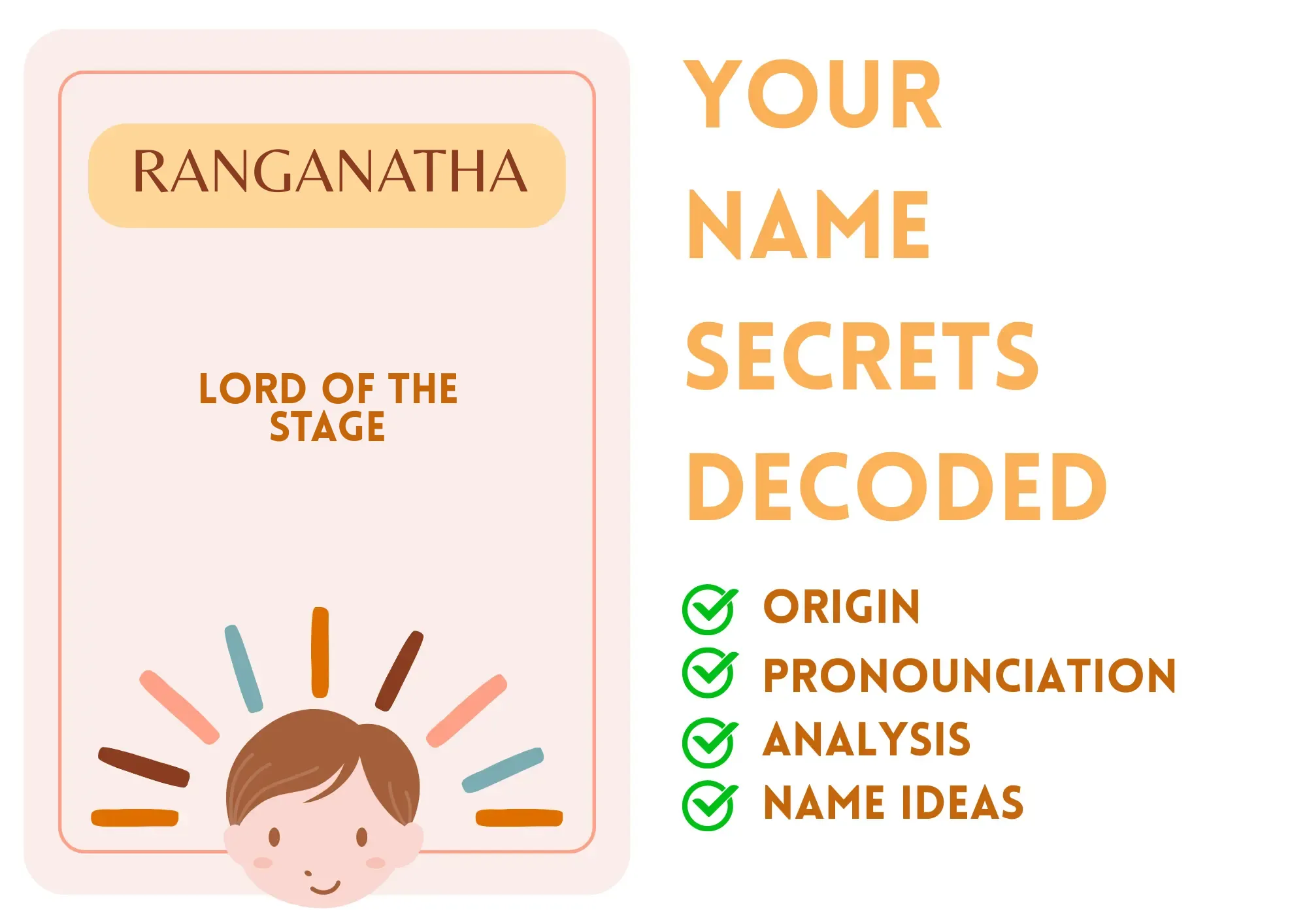
Ranganatha
Ranganatha is a name rich in cultural and religious significance, primarily stemming from Sanskrit. It translates to 'Lord of the Stage' or 'one who delights in the stage', referring particularly to Lord Vishnu as the central character in many forms of classical Indian theater and performance arts. The name is predominantly used in South Indian cultures, particularly among Hindus.
Ranganatha is predominantly a masculine name, deeply respected in Hinduism, as it is associated with divinity, performance arts, and devotion. The name embodies an essence of artistic expression, beauty, and the divine play (Lila) in life's theatrics. Culturally, it represents a link to classical art forms like Yakshagana, and is beloved in communities emphasizing tradition and spirituality.
The name is often perceived positively, evoking a sense of artistry and piety. It is manageable in writing and calling, though it may challenge some with its length. Nicknames like Ranga or Natha are common. Overall, Ranganatha stands out for its profound meanings and connection with performing arts, making it a notable choice among parents.
Basic Information
Gender: Boy
Sounds Like: RAN-ga-na-tha
Pronunciation Explanation: The name is pronounced with emphasis on the first syllable 'RAN', followed by 'ga', 'na', and completed with 'tha'.
Summary and Meaning
Meaning: Lord of the Stage
Origin: The name Ranganatha has Indian origins, particularly tied to South Indian culture and the Sanskrit language.
Usage: Ranganatha is traditionally a masculine name, reflecting its deep-rooted associations with male deities in Hinduism.
Name Number (Chaldean)
Name Number (Pythagorean)
Name Constellation (Nakshatra)
Name Zodiac Sign (Rashi)
Popularity (Global Rank)
Overall: 44095
Boys: 72681
Most Popular in
Religious and Cultural Significance
Religion: Hindu
Background: In Hindu culture, Ranganatha represents Lord Vishnu, who is often worshipped in the form of a deity associated with beauty and theatricality. The name is imbued with artistic significance and divine associations.
Cultural Significance: Ranganatha is culturally significant within Hinduism, often associated with traditional theatrical performances and the divine nature of the arts.
Historical Significance: Historically, Ranganatha has paramount importance in traditional Indian performances and rituals, symbolizing the intersection of the divine with the human experience through art and drama.
Popular Culture
Literature and Mythology: The name appears in various mythological texts where Lord Vishnu plays significant roles; it is also represented in classical dance dramas.
Movies and Television: Characters named Ranganatha or inspired by this name appear in Indian television serials and films that depict mythological narratives, often associated with divine friendships or artistic endeavors.
Feelings and Perceptions
Perception: Ranganatha is generally viewed positively, radiating feelings of spirituality and deep connection to the arts. It is considered unique and culturally rich, though it may require explanation in non-Indian contexts.
Positive Feelings: Artistic, divine, beautiful, profound, unique and spiritual.
Negative Feelings: Its length might be daunting for some, and unfamiliar pronunciation could lead to hesitance.
Practical Considerations
Ease of Writing and Calling: Ranganatha, although longer, can be written and called fairly easily by those familiar with the name, featuring five syllables that might present challenges to those not accustomed to South Indian names.
Common Typos and Misspellings: Ranganatha,Rangantha,Rangnatha,Rangntha,Rangnatha
Common Nicknames: Ranga,Natha,Rang
Ranganatha Popularity
Ranganatha Usage and Popularity By Country
| Country | Rank (Overall) |
|---|---|
| India | 8832 |
| Bahrain | 9628 |
| Sri Lanka | 17967 |
| United Arab Emirates | 26602 |
| Singapore | 33073 |
| New Zealand | 33723 |
| United Kingdom | 90588 |
| United States | 102851 |
| Australia | 105589 |
Ranganatha Usage and Popularity By City
| City | Rank (Overall) |
|---|---|
| Bengaluru | 2404 |
| Bangalore | 2087 |
| HyderÄbÄd | 9000 |
| Tumkur | 194 |
| Chitradurga | 85 |
| Maisuru | 1195 |
| Kolar | 479 |
| Raichur | 361 |
| Washim | 9450 |
| Gulbarga | 1381 |
Compatibility Analysis
Famous Persons Named Ranganatha
No results found for Ranganatha.
Related Names
Similar Sounding Names:
Ranjan,Raghu,Ranveer,Ranjitha